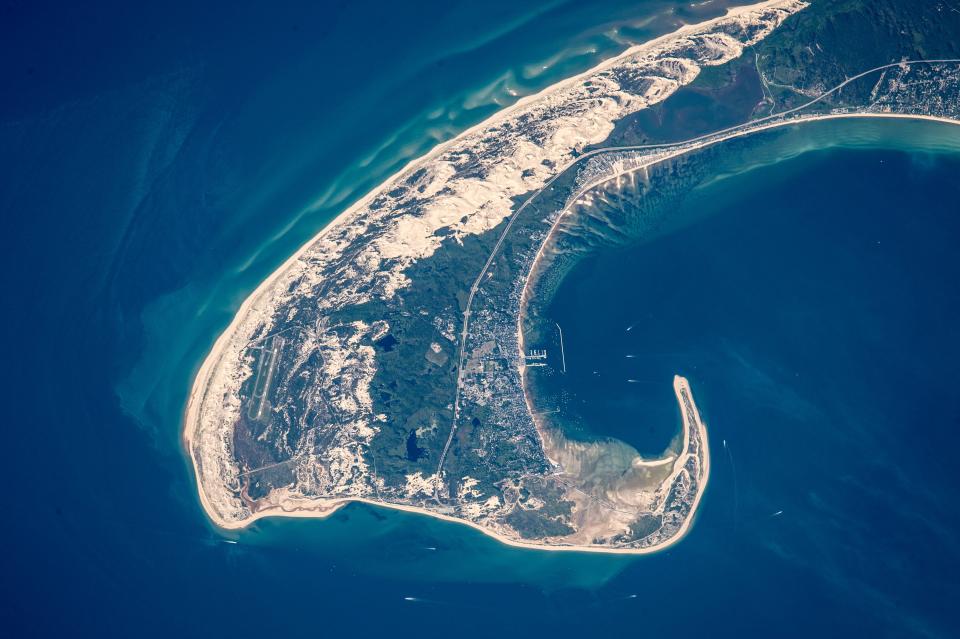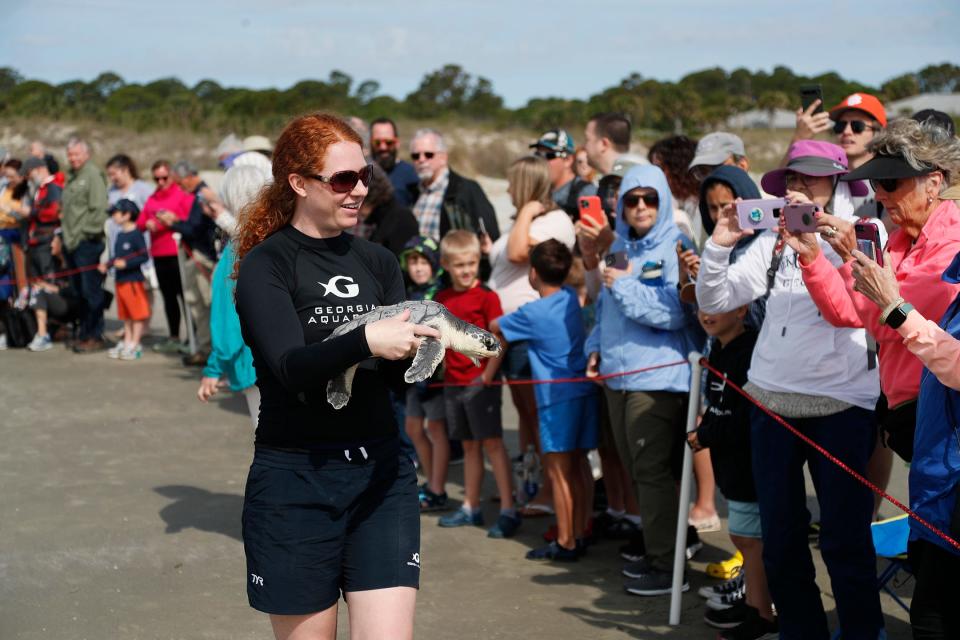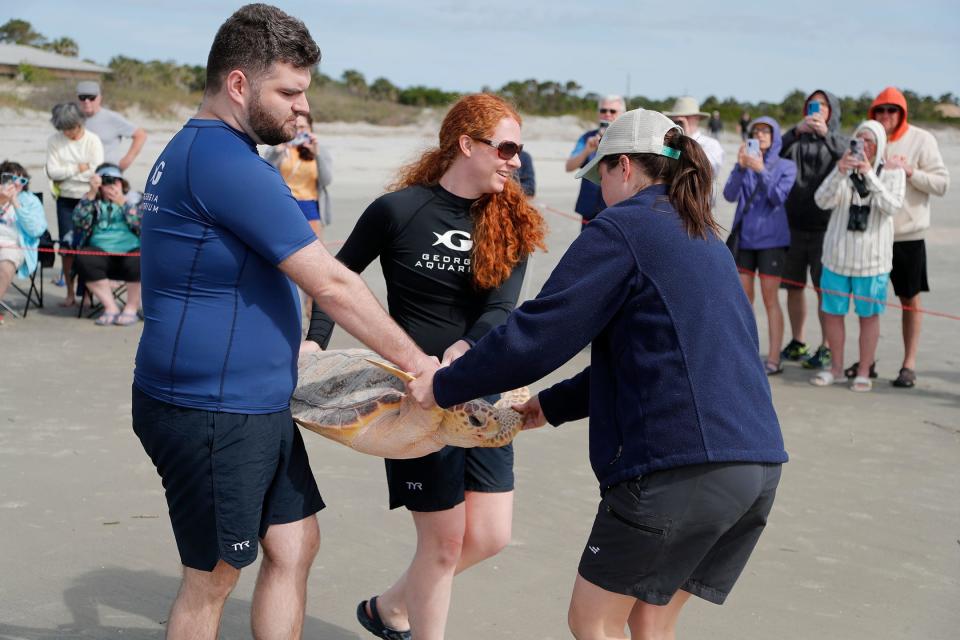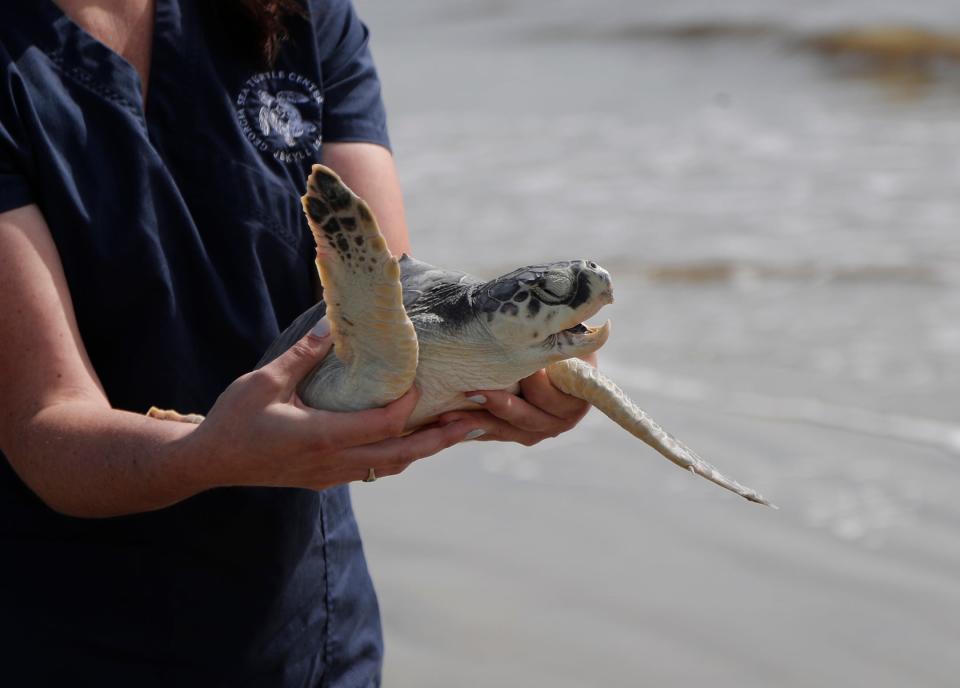Back to sea: Georgia Aquarium, Sea Turtle Center release cold-shocked turtles off Jekyll Island
The shining sun broke through an overcast sky on Monday, reflecting off the ocean and into the squinted eyes of hundreds of visitors to Jekyll Island who watched as distant flippers disappeared into the horizon.
The Georgia Sea Turtle Center and the Georgia Aquarium partnered to release eight sea turtles off Great Dunes Beach Park on April 17 on Jekyll Island. The six Kemp's ridley and two loggerhead sea turtles were rehabilitated by the aquarium after suffering from cold shock in the chilly waters off Massachusetts this winter.
Last nesting season: Georgia's record breaking sea turtle nesting season winds to a close
How are nests protected? The Caretta Research Project celebrates 50 years of loggerhead conservation on Wassaw Island
Visiting from the north
The rehabilitated, juvenile sea turtles came to Georgia from Cape Cod Bay, Massachusetts, a peninsula that juts out of the state in an upwards hook. Michelle Kaylor from the Georgia Sea Turtle Center said that when sea turtles encounter too-cold waters they turn south but get caught in that hook. Each year, thousands of sea turtles appear stranded on these beaches where trained volunteers locate and bring those cold-shocked turtles in for treatment.

Sea turtles are reptiles just like snakes, lizards, or turtles on land. Unlike humans and other mammals, they don't create their own heat to stay warm but regulate their temperature based on their environment. When the turtles are in water that is too cold they get cold-shocked, a condition likened to hypothermia humans would get. The turtles become lethargic and can appear on shore stranded, nearly lifeless.
The New England Aquarium does most of the "triaging," Kaylor said, and then reaches out to rehabilitation facilities, aquariums and zoos across the nation to see who has open hospital beds to rehabilitate the turtles and prepare them to head back out in the spring. This usually takes place starting in November through December and sometimes into the new year, and each year varies in severity of how many turtles are cold-stunned.

"People spend so much time and energy getting these turtles back, ready to go out," said Carolyn Murphy, senior aquarist at the Georgia Aquarium. "It's definitely all hands on deck when these mass stunning events do occur."
The turtles, aside from cold-stunning, can have other secondary issues like osteomyelitis ― a type of bone infection ― pneumonia in the lungs, eye ulcers or lesions on their bodies that need tending. Kaylor said there are many ways the staff evaluate when turtles are ready to head back to sea, including their ability to eat live prey.
"It can take a lot of time, sometimes six months to a year if not more, depending on what's going on with those turtles individually as patients," Kaylor said. Between the Georgia Aquarium and Georgia Sea Turtle Center, there are three more turtles ― one Kemp's ridley and two loggerheads ― that still need a little more time rehabilitating before they are released and will head back to the water later this year. Their injuries include an eye sore, a wound to the top shell called the carapace and a rear flipper injury respectively for the turtles named Eeyore, Honey Badger and Jordan.

A conservation legacy for Georgia's coast
Loggerhead sea turtles are the most common visitors to Georgia's shore. The species' populations have in recent years started to rebound after sharp declines due to consistent nest preservation and conservation efforts from groups all along the eastern seaboard.
Kemp's ridleys are the smallest, and most endangered, sea turtles Georgia sees off its coast. They grow only to 80 to 100 pounds, whereas the heftier loggerheads can weigh in around 200 to 350 pounds. They are the only sea turtles that nest during the day, rather than coming up onto the beaches at night like other species, and they also nest en masse rather than individually.

For many locals and frequent visitors to the coast, seeing a sea turtle in person these days isn't a new experience, thanks to growing beach-nesting populations and educational facilities. Spring breakers Cami Boyd and her daughter Kensi, regular Jekyll visitors, were visiting from Florida. Although Cami had seen a sea turtle in person before it was Kensi's first time. Meanwhile, Audrey Hurd, Lacey Finn and Raquel Ugarte, coworkers at The Wharf on Jekyll, spent their morning off enjoying a sea turtle release right in their own backyard for the first time.
Marisa is an environmental journalist. She can be reached at 912-328-4411 or at mmecke@gannett.com.
This article originally appeared on Savannah Morning News: Jekyll Island Sea Turtle Center, Georgia Aquarium release loggerhead Kemp's ridley

